|
|
|
Sort Order |
|
|
|
Items / Page
|
|
|
|
|
|
|
| Srl | Item |
| 1 |
ID:
128851
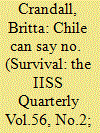

|
|
|
|
|
| Publication |
2014.
|
| Summary/Abstract |
Two recent books tell the story of the transition to Chile's now-vibrant democracy. Their complementary perspectives provide context for the choices Chileans made in last year's presidential elections. In an eerie confluence of fates, the two top contenders for Chile's presidency in late 2013, Michelle Bachelet and Evelyn Matthei, were actually childhood playmates. Their fathers, both air-force generals, had been friends and neighbours, but had contrasting political leanings and found themselves on opposite sides of the dictatorship that seized power in 1973. Mr Bachelet had become a high-ranking official in Salvador Allende's socialist administration, and was effectively tortured to death after the 1973 military coup that installed Augusto Pinochet as president. Mr Matthei, in contrast, was a rising star within the Pinochet regime, becoming head of the air force and ultimately working in the building in whose basement Mr Bachelet was detained and tortured. Thus, Michelle Bachelet and Evelyn Matthei represented not only two different futures, but two opposing pasts. While Bachelet promised free universal education and political reform, Matthei vowed to continue the policies of Chile's outgoing conservative president. The symbolism was anything but subtle.
|
|
|
|
|
|
|
|
|
|
|
|
|
|
|
|
| 2 |
ID:
128843
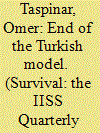

|
|
|
|
|
| Publication |
2014.
|
| Summary/Abstract |
The Turkish model of democracy, economic competence and regional influence is not unravelling because of a clash between Islam and secularism. The real conflict is between electoral democracy and liberalism.
|
|
|
|
|
|
|
|
|
|
|
|
|
|
|
|
| 3 |
ID:
128842
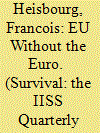

|
|
|
|
|
| Publication |
2014.
|
| Summary/Abstract |
The single currency was supposed to have led to greater political union, but the policies taken to ensure its survival are having the opposite effect. An orderly retreat from the euro might be the EU's least-bad option. As the euro area enters its seventh year of economic stagnation, the future of the European integration process remains in suspense. In the medium-to-long term, highly divergent scenarios remain possible, with variable degrees of likelihood, from full-blown federalisation at one extreme to the catastrophic collapse of the euro and of the European Union at the other. Somewhere in between comes the actual set of policies currently followed, sometimes described as 'muddling through', more aptly called 'muddling down' in terms of its effects on growth and mass unemployment. Since the middle of 2012, the mix of recessive policies of 'internal devaluation', limited pooling of eurozone liabilities and decisive intervention by the European Central Bank (ECB) have deferred for an undetermined period of time the risk of a disorderly break-up of the euro. The strategic consequences of this range of potential and actual policy paths have been discussed in previous issues of Survival.
|
|
|
|
|
|
|
|
|
|
|
|
|
|
|
|
| 4 |
ID:
128841


|
|
|
|
|
| Publication |
2014.
|
| Summary/Abstract |
Germany's highest court stopped short of ruling the European Central Bank's programme to support the euro illegal. Now the European Court of Justice must find a way to make the programme acceptable without making it ineffective.
|
|
|
|
|
|
|
|
|
|
|
|
|
|
|
|
| 5 |
ID:
128849
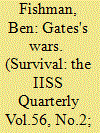

|
|
|
|
|
| Publication |
2014.
|
| Summary/Abstract |
Robert Gates takes deserved pride in his achievements at the Pentagon. But he leaves an important part of the debate about America's future role in the world unaddressed. Very few government officials start in entry-level positions and manage to climb all the way to the role of agency head or cabinet secretary. So it says something about Robert Gates's professional stamina and political acumen that, having begun his intelligence career as a young Soviet analyst at the CIA in 1968, he worked his way up to become the agency's director in 1991. Several stints at the White House, in both Democratic and Republican administrations, helped pave the way. He was the first CIA director to emerge from its professional class (John Brennan only recently became the second), an especially notable achievement for an analyst in an institution that long privileged its clandestine service.
|
|
|
|
|
|
|
|
|
|
|
|
|
|
|
|
| 6 |
ID:
128848
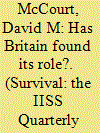

|
|
|
|
|
| Publication |
2014.
|
| Summary/Abstract |
The question is not whether Britain is a great power, but whether it does what great powers do. In the absence of wider changes, Britain will continue to play this role. 'What is Britain's role in the world?' Answering this question is a vital step in a successful review of British security and defence provision. The conclusions of the latest chapter of this review process will be published in 2015, in an update to the 2010 Strategic Defence and Security Review (SDSR), which was itself the first for 12 years. The 2010 SDSR declared that 'any strategy for our national security must begin with the role we want to play in the modern world.' As Liberal Democrat Member of Parliament Menzies Campbell put it, 'the central question is: what role do we want Britain to play, and how much, as a nation, are we prepared to pay?' Defence reviews are thus about more than how many guns, ships and aircraft the armed forces will have at their disposal; they are concerned with thinking holistically about Britain's place in the world.
|
|
|
|
|
|
|
|
|
|
|
|
|
|
|
|
| 7 |
ID:
128844


|
|
|
|
|
| Publication |
2014.
|
| Summary/Abstract |
Tehran's military capabilities do not match its ambitions for recognition and status. It is cautious, defensive and prudent in resorting to force, due as much to experience as to realism about its own limits. Iran has been a source of international concern for decades. Its general hostility to the international system disturbs the regional order. Tehran's initial aim of exporting the 1979 revolution, supplanted later by exporting its revolutionary model, has caused anxiety in smaller, traditional regimes. And the view that it is a belligerent state all too ready to resort to force feeds concern about its nuclear ambitions. This perspective, largely shared by Israel and some members of the Gulf Cooperation Council, is plausible but incomplete. I will argue that by orthodox standards Iran is militarily weak, and cautious, defensive and prudent in resorting to force. This is due as much to experience as to realism about its own limits. The country does not see itself as a military power or aspire to become one, even if some of its utterances and behaviour leave room for scepticism on this point.
|
|
|
|
|
|
|
|
|
|
|
|
|
|
|
|
| 8 |
ID:
128846
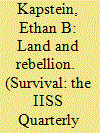

|
|
|
|
|
| Publication |
2014.
|
| Summary/Abstract |
A study of land reform illuminates the paradox of economic instruments in counter-insurgency. Where redistributive demands are at the core of a rebellion, foreign powers will find it difficult to respond effectively. Recent years have seen the United States and its allies embroiled in major counter-insurgency campaigns in Afghanistan and Iraq, and lesser operations in such countries as Yemen and Somalia. These battles against local insurgencies are only the latest in a string of such conflicts that have erupted in nearly every developing region since the end of the Second World War. Sharply debated at home and abroad, they raise the fundamental question of what the counter-insurgents can reasonably hope to achieve in violent settings, even when they deploy an array of military, political and economic instruments. What are the 'moving parts' that foreign powers can manipulate in their efforts to force or encourage violence-reducing reforms in these societies?
|
|
|
|
|
|
|
|
|
|
|
|
|
|
|
|
| 9 |
ID:
128845


|
|
|
|
|
| Publication |
2014.
|
| Summary/Abstract |
Narratives that dramatise and simplify conflicts should be corroded by exposure to complex reality. Yet they retain their mobilising power in the Middle East, topped up by conspiracy theories. To an outside observer, the picture that the Middle East conflict landscape offers is indeed complex and confusing. Littered with interlocking and overlapping conflicts, there is a wealth of narratives that allegedly explain why this is so, outlining who is the designated enemy or ally of whom, and for what reason. But when one compares the reality on the ground to these narratives, things often look quite different. In many instances, it almost seems that the conflicting parties have a distinct preference for allying not with their supposed brothers in spirit, but with their ideological opposites. The proverb 'the enemy of my enemy is my friend' seems a better guide to the Middle East conflict landscape. This raises questions about the role that narratives have played, and still play, in Middle East conflicts, and how much these stories produce or only mirror realities on the ground.
|
|
|
|
|
|
|
|
|
|
|
|
|
|
|
|
| 10 |
ID:
128850
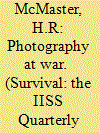

|
|
|
|
|
| Publication |
2014.
|
| Summary/Abstract |
A thematic selection and analysis of war photography across 165 years has tremendous explanatory power about the nature of modern war and the human experience in war and its aftermath. The year 2014 brings centennial commemorations of events that helped make the twentieth century the bloodiest in human history. Among these are the assassination of Archduke Franz Ferdinand on 28 June, Germany's invasion of Belgium and France on 4 August, and the First Battle of the Marne in early September - the battle that halted the German offensive and ushered in an unprecedented period of stalemated, destructive warfare on the Western Front. As historian Margaret MacMillan has observed, the First World War still haunts us not only because of the scale of the carnage and suffering, but because so many believed that the early-1900s version of globalisation and interdependence had rendered war futile. The comparisons to today seem obvious, as the United States and European nations cut military budgets based, in part, on the belief that large-scale armed conflicts are relics from a barbarous past. If, however, peace remains as the Ancient Greek historian Thucydides described it over 2,500 years ago - 'an armistice in a war that is continuously going on' - understanding war and warfare will remain important for preventing conflict, as well as for its effective conduct. Understanding war's human, psychological and social dimensions requires an interdisciplinary approach and study across multiple genres including literature, art, film and photography.
|
|
|
|
|
|
|
|
|
|
|
|
|
|
|
|
| 11 |
ID:
128847
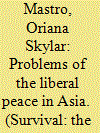

|
|
|
|
|
| Publication |
2014.
|
| Summary/Abstract |
The conviction that economic ties will engender peace is a lynchpin of US strategy, but Asian leaders view failure to protect territorial claims as worse than the losses associated with a limited war. The conviction that economic ties will engender peace in Asia has been a lynchpin of the US strategic response to a rising China for over two decades. When the US-China Relations Act of 2000 passed under President Bill Clinton, proponents of the measure argued that increased Sino-American trade would contribute to China's peaceful rise because Beijing would reject revisionism while it benefitted from the US-led world order. As one US senator commented at the time, 'the world will be a safer place - or so we hope, and so history argues'. Later, President George W. Bush described the exchange of 'many handshakes of friendship and commerce' between the American and Chinese people as enhancing understanding and therefore peace. Moreover, many of his closest advisers hoped that Chinese economic growth would eventually result in a rising middle class that would demand political freedoms and compel reform of the one-party Communist system. Most recently, President Barack Obama extolled the benefits of China's growing economic clout, declaring that 'a peaceful and stable and prosperous China is not only good for Chinese but also good for the world and for the United States'.
|
|
|
|
|
|
|
|
|
|
|
|
|
|
|
|
| 12 |
ID:
128840
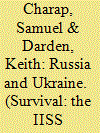

|
|
|
|
|
| Publication |
2014.
|
| Summary/Abstract |
The West has often assumed that Russia is inherently hostile to Ukraine, and the Marchevents seem to validate that assumption. But Moscow's moves are in fact a realdeparture from previous Russian policy.
In his book The Clash of Civilizations and the Remaking of World Order, Samuel Huntington makes the case for the utility of an external enemy in maintaining a coherent US national identity. 'For self-definition and motivation, people need enemies', he wrote.1 His thesis has been widely discredited. But recent developments in Ukraine seem to have partially validated the claim, and given it a new dimension. After 25 years of the West treating Russia as an enemy in Ukraine, Moscow might have really become one. Even prior to recent events, the depiction of Russian policy in Ukraine as nefarious has always, of course, held a kernel of truth. Russia's actions there since the Soviet collapse have been far from constructive and transparent. And the rhetoric of senior officials - in a particular notorious example, Vladimir Putin himself questioned whether Ukraine was a real country in a private moment with George W. Bush - has at times been inflammatory, subversive or incendiary.
But until the collapse of the EU-brokered political settlement on 21 February, Russia's actions in Ukraine had never merited the labels usually ascribed to them: expansionist, neo-imperial, neo-Soviet, aggressive, and so on. Indeed, until that watershed moment, it would have been wrong to attribute any significant development in Ukraine's recent political crisis to Russia. Yes, in the autumn of 2013 Russia did use economic levers to demonstrate to President Victor Yanukovich the costs of proceeding with the proposed Association Agreement with the EU. But it was Yanukovich, at the end of the day, and not Putin, who decided to make the shift - and it is unlikely that the Ukrainian president was serious about implementing the agreement in the first place. Even so, Russia's levers in Ukraine are entirely of the Ukrainians' making. If Yanukovich or any of his predecessors had spent less time getting rich off the gas trade with Russia, and more time implementing a comprehensive energy-efficiency policy (Ukraine has one of the world's highest rates of energy consumption per unit of GDP), creating a domestic gas market and forging an investment climate conducive to the development of Ukraine's own gas reserves, Moscow would not have had any significant economic leverage. The effectiveness of economic coercion in this case is no credit to Russia's strength; rather, it is a reflection of the utter failure of the Ukrainian elite to reform the country's economy.
|
|
|
|
|
|
|
|
|
|
|
|
|
|
|
|
| 13 |
ID:
128852
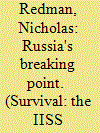

|
|
|
|
|
| Publication |
2014.
|
| Summary/Abstract |
As Russia mulls its next move in Ukraine, consideration of its allies' reactions might have greater weight than the response of the West. The strength of Russia's reaction to events in Ukraine should have surprised no one. Two of the major preoccupations of Russian foreign policy in the last decade have been efforts to bolster governments under assault from their restive populations and, from Moscow's perspective, the threat of external intervention, and a determination to establish and defend a zone of privileged interests across the former Soviet Union by making progress with its integration projects. In Ukraine in February 2014, those two preoccupations came into full alignment. Margelov's statement captures Russia's general disapproval of the disorder created by the Arab Spring, and the sense of an immediate threat to Russia that is implicit in an EU-assisted coup d'état happening on its doorstep.
|
|
|
|
|
|
|
|
|
|
|
|
|
|
|
|
|
|
|
|
|